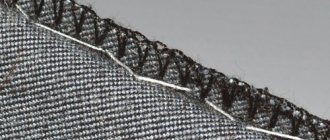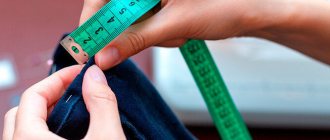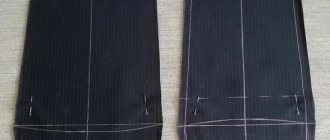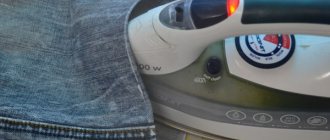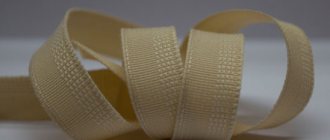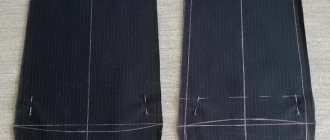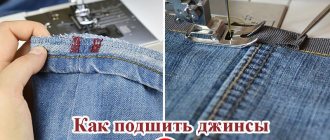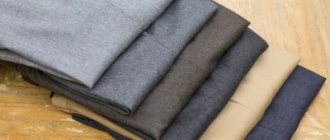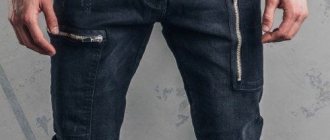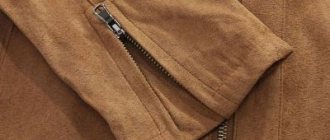Hemming trousers or sewing the hem of a skirt by hand is not always as easy as it seems. In the atelier, classic men's or women's trousers are hemmed on a special machine. Instead of thread, transparent thread (monofilament) is often used, so the hemming seam is not visible from the front side.
The hem of the bottom of men's trousers is first overlocked using an overlocker, then the trouser tape is sewn on with two lines using a machine. For women's trousers, braid is not used. Sometimes, depending on the type of fabric and model of trousers, a finishing stitch is used instead of a hidden hem stitch. Basically, this treatment is used to secure the hems of knitted and children's trousers.
In this video you will learn how to hem men's trousers with trouser tape on a sewing machine. The hem of the trousers is secured with a hidden hand stitch.
At home, trousers must be hemmed manually using a hidden seam. In most cases, you can even fix the hem with a web, but be sure to duplicate it with a hidden stitch. In any case, it is advisable to know some of the features of this technology in order to hem trousers correctly and beautifully. How to hem trousers so that the seam does not “pull” and the hand-stitched threads do not come out on the front side, the tape does not “fray”, etc. Check with a professional tailor for recommendations.
Flower nursery Green Gate
Do you like indoor or garden flowers? At the Green Gate nursery you can buy rooted cuttings and divisions of various domestic and perennial garden flowers. We have a constantly updated collection of anthuriums and hibiscus. Flowers and plants are sent by mail.
How to hem tapered trousers
If we try to roll up a trouser leg of this shape, we will see that the width at the bottom is less than the width of the trouser leg at the sewn height.
The hem size for men's trousers should be at least 4 cm, for women's trousers - 3 cm.
The problem of lack of width can be solved by opening the seams of the trouser leg to the width of the hem and stitching them with a minimum allowance. We compensate for the required width due to allowances. The problem of width discrepancy is especially acute in women's tapered trousers.
Workshop “from Idea to Result”
Now, the Creativity section has moved there. There will be master classes, courses, consultations on sewing, decorating clothes and creating accessories. In the “Blog” section, I publish posts on fashion and handicrafts. I created this platform for our communication. Let's be friends!
Follow the link ideatoresult.com
How to hem trousers using tape
The tape is matched to the color of the trousers. It is advisable to use braid with a tight weave. It costs more than thin braid, but is also more durable.
We baste the tape, aligning its edge with the hem line. We sew the line, retreating 1 mm from the edge of the tape. In the finished product, the tape will peek out, protecting the trousers from rubbing along the fold. For beginning seamstresses, maintaining such precision can be difficult. Therefore, it is permissible to stitch at a distance of 4-5 mm, and then, when ironing, lay out the protruding hem by 1-2 mm.
When sewing, you need to maintain the tension of the tape and fabric correctly. If the tape is slack, we will get a wavy edge of the trouser leg. If you pull the tape, there will be a narrowed edge.
Preparation
You can’t do this without an assistant, since measurements are taken on a person. If you have other hemmed pants of the same style, then it is acceptable to use them as a sample. The product is pre-ironed and dried.
The marks are placed in the middle of the back of the trousers using fine soap (it is easier to wash off than chalk). They are placed along the entire circumference, and then connected to each other along a ruler. There are 2 types of markings:
- The pants are folded up to a certain level and pinned. Clothes are removed and the distance from the belt to the mark is measured. At the same level, mark the second leg.
- In case of poor posture, different leg lengths and other features, the first option is not used. Therefore, the marks are placed not from the belt, but from the floor.
If the length is chosen correctly, the pants will gather in a small fold at the shin.
How to hem trousers by hand using a blind seam
For this operation, a thin and short needle is used. The thread should be thin and strong, in one fold. We process the edge of the trouser leg with an overlocker. The seam is laid (see photo) below the overlock stitch. This way it will be hidden under the edge of the fabric, and this will prevent it from tearing when putting on trousers.
To make a seam, you need to turn the bottom of the trouser leg inside out. Using the point of the needle, we grab one or two threads from the weave of the fabric. On the front side you will get almost invisible stitches. In the area under the overlock stitch, you can grab a larger number of fabric threads with the needle. Stitches along the front side and hem should be done not in one puncture, but one at a time, controlling the thread tension. Having stitched 10 cm, we try to stretch this area by hand. This way we will check if the thread is overtightened.
Final stage
Sew a tuck around the circumference of the trouser leg. At this stage you will sew on the resulting cuff. You can sew by hand or use a sewing machine. The seam should be smooth and neat.
Unfold the pant leg, straightening the fold back. You need to pull out the folded cuff so that the original edges of the trousers appear again. Measure the length of your jeans to make sure both legs are the same length. You can try it on to make sure you like the length. If later you want to return to the original length of the trousers or are confident in your decision to cut off the excess length, you can embroider and cut off the legs.
Now you should iron the bottom of the pants. Use the steam setting on your iron to remove any creases. Ironing will reduce the folded fabric that is inside the legs.
When shopping for pants, I don't worry about extra length because I can remove it without much effort. At the same time, you don’t need to cut anything for fear of ruining the new thing. A fold sewn from the inside can always be ripped open and stitched again. This will also help you always follow fashion - while there is a trend for shortened options, the fold can be made larger.
Found a violation? Report content
How to hem trousers using a machine with a blind seam
There is a special foot for this operation. You can use it by first practicing on waste fabrics.
Although, in fact, if for thick and loose fabrics (ideally even melange or multi-colored) it is still possible to hem the bottom on a machine, then for thin, light or even worse - plain - this method is not very suitable.
Professionals usually sew the hem on a hem machine or by hand using a blind stitch.
How to choose threads?
You can shorten jeans without cutting the bottom if you have high-quality threads that match or contrast with the denim. As a rule, they are matched to the color of the stitching used to process the side or internal factory seam.
When buying threads for work, you need to adhere to the basic rules:
- For thin fabric, use thread No. 50 - 60.
- For dense materials, choose No. 30 - 40.
- It is recommended to use a sewing machine needle number 100.
In addition to the number of threads, the material and method of their manufacture are important.
To work with denim, it is recommended to use:
- reinforced threads (65LKh, 65LKh-1 and 65 LL) - they are characterized by high fiber strength and minimal hairiness, they have a high ability to abrasion;
- polyester threads are highly resistant to abrasion, most often used for repairing denim;
- polyester - the most elastic threads; they are used to process sections of denim fabric.
When marking reinforced threads, letters indicate the material of the fibers from which the thread is woven.
For example:
- LL are flax and lavsan fibers.
- LH - made of cotton and lavsan.
How to quickly do a hem with your own hands using a spider web
Adhesive web is a translucent tape with an adhesive coating applied on both sides. Thanks to this, the web is very convenient to use to secure the hem of the bottom.
There is a life hack - using a web in combination with a seam. First, fix the hem of the trousers with a web. Then they also hem it with a hand-blind seam.
They do this because the adhesive properties are lost due to frequent washing, the folded edge comes off and soon you will still have to hem it by hand.
Forming a fold
Fold the pant leg up. Then position the fold so that it lies flat. Measure half the distance you wrote down (from the fold). You can mark the line using a ruler. To do this, you need to measure the required distance on both sides and draw a line. Make sure you mark the pants at the correct height. After doing this on one pant leg, do the same on the other.
How to hem men's knitted trousers at home
Sweatpants are most often hemmed with finishing stitching. Gossamer is not suitable for knitted fabrics, because in the glued areas the fabric will become rigid and lose elasticity and stretchability.
On knitted trousers, the hem is rolled up and ironed. Then they are fixed with basting stitches, checking the coincidence of the side seams. And only after this the finishing stitch is performed.
On sports knitted trousers, two such lines are made on a sewing machine, laying them parallel.
How to hem knitted pants with cuffs, see the video below.
With trouser braid
Before hemming your pants, you need to decide on the color and texture of the braid. It can be purchased at textile stores.
Step by step steps:
- Make a fold line on the trousers;
- Attach trouser tape to it;
- Sew it exactly in a circle;
- The edge can be trimmed or finished with tape.
If the braid sticks out, it will quickly begin to shine and the pants will look sloppy. This method requires a high level of sewing. More suitable for hemming children's trousers.
Tapered models
How to hem classic men's trousers
It often happens that ready-made trousers with a finished hem do not fit in length, and the question arises of how to properly hem trousers for men.
There is nothing complicated in this operation; even the most experienced seamstress can easily tuck and hem trousers on a sewing machine.
To adjust the length we will need trouser tape.
To determine the required length of the braid, you need to measure the width of the back half of the trousers along the bottom, add 2-3 cm for shrinkage and another 3 cm for allowances. We multiply the result by two and get the required length with a small margin. Please note that the braid can be sewn around the entire perimeter or just along the back half. Our master class discusses the second option.
The braid must be sealed, otherwise it will shrink later and we will get unsightly folds along the bottom of the trousers.
We determine by trying on the required length of the trousers and pin them. This is usually done on one trouser leg, the second is hemmed by the same amount (if there is no difference in the lengths of the right and left legs). If the difference in leg lengths is significant, then hemming of each trouser leg is done separately.
We must rip out all the factory stitching along the bottom.
We sew a new bottom line (at the height for the finished product). We cut off the excess length, leaving an allowance of 3.0-3.5 cm.
In the area of the intended hem, we rip out the machine stitches on the vertical seams and overcast the edges. After completing the new hem, everything that has been torn apart will, of course, be sewn together.
Above the basting seam line, at a distance of 1 mm, draw a line for attaching the trouser tape.
We pin the trouser tape to this line (the tight edge of the tape should be adjacent to the line).
We attach the braid by making two lines at a distance of 1-2 mm from the edge of the tape.
The edges of the tape that were hemmed must be carefully tucked into the hemmed seams, without cutting off any excess length. We restore the stitching in these areas and then cut off the excess length of the braid. We overlock the cuts of the vertical seams.
Sew the bottom edges of the trousers.
We make a hem along the basting seam and iron it. In this case, the trouser braid should protrude 1 mm beyond the lower edge of the trouser leg.
We manually hem the edges of the hem using a blind seam as described above.
Iron the hem with the turn on the wrong side, not reaching the hidden seam, otherwise you will get an unsightly overlock stitch mark on the front side.
What length should pants be?
Length plays an important role in how you look. It emphasizes your strengths, lengthens your legs, and visually corrects figure flaws.
However, improperly hemmed trousers can radically ruin the appearance. You may look ridiculous and even funny. It would seem like two or three centimeters, but they are the ones that will play a fatal role in creating your image.
Important! Before you shorten your pants, decide what shoes you'll wear with them. Mark the cutting line, taking into account the height of the heel or sole.
Women's trousers length
The following length is popular among women, which is directly related to the style of the products.
- Straight classic: the length of the trouser leg should be 2-3 cm from the floor or reach the middle of the heel.
- Tapered at the bottom: should slightly open the ankle and be a couple of centimeters shorter than the classic size.
- Wide: the hem must touch the floor; the toe of the shoe should only be visible from under the legs.
- Flared: length reaches the middle or 2/3 heels.
Men's trouser length
Men have their own traditions and rules.
- Classic: There should be a small fold at the junction of the shoe and the trouser leg. And the back of the trouser leg should cover half the heel of the shoe. Pants should not touch the floor. They should not reach it by at least one centimeter.
- Tapered: It is not advisable for the pants to cover the lacing on the shoes, and the back and front should touch the edge of the shoe.
- With a turn up: the length depends on your height and the height of your shoes. The shorter the height, the narrower the collar should be. In any case, the cuff is no more than three centimeters.
Please keep in mind that some materials shrink after washing and therefore the size of the garment may change.
Important! When purchasing, it is better to choose products in which the legs are slightly longer than necessary. After all, you can always remove excess fabric.
How to determine the correct length when trying on
When going shopping, you are unlikely to take a ruler or measuring tape with you.
In order not to make a mistake with the length of the trousers, it is better to measure the item in the shoes with which you plan to wear them. It is important to pay attention to the heel, because it adds height. And a thing worn with and without a heel will look completely different on you.
It is advisable to insert a belt when trying it on if you plan to wear one in the future. A fastened strap can also shorten the item by a couple of centimeters.
By adhering to these simple rules, you will avoid mistakes when purchasing.
How to determine the length without trying on
Another option for determining the required length. With it you can do without fitting. But in this case, you will need to use other pants that suit all parameters. Fold them along the arrows on a flat surface. By placing one on top of the other, you can make sure whether this item fits in size or not.
How to easily hem jeans while maintaining the factory seam
This need arises quite often. But, you don’t want to lose the unusual finishing stitching or wear. What to do? We will tell you a step-by-step life hack on how to properly hem jeans while preserving the factory decorative stitches.
To solve this problem we will need regular sewing tools.
We try on and determine how much length needs to be cut. Mark the new bottom line with pins or chalk.
We combine the new line and the old factory finishing stitch.
On the wrong side we get a fold.
We measure the size of the fold in several areas and level it to equal sizes.
We fix it with pins according to this size.
Then we sew the line, trying to go very close to the factory hem.
At the same time, it is important to control the coincidence of the vertical seams, otherwise we will not be able to hem the jeans beautifully - the bottom will turn out sloppy.
After you trim the excess fold fabric, leaving a 1.0-1.5 cm allowance, you should process the cuts with an overlocker or zigzag stitch.
Fold the hem down. Iron the seam allowance up. We secure it with a decorative stitch into the seam or stitch it at a distance of 1-2 mm from the seam. We hem the seam allowance with threads matching the color of the denim or contrasting ones.
The same life hack can be used to adjust the length of women's trousers. They can be hemmed just like jeans - while maintaining the factory seam.
Having decided on the desired length, we combine the desired bottom line with the finishing line. Align the hem size. We sew the line as close as possible to the edge of the factory fold.
We cut off the excess amount and process the cuts with an overlocker.
Turn over the seam allowances and iron them upwards. We fix it with a decorative stitch into the seam (if you want an invisible seam) or by retreating 1-2 mm from it.
Iron the seams.
Useful tips for hemming trousers
- Before hemming a new item, be sure to wet or wash it. The fabric tends to shrink.
- Iron folded trousers from the inside out. Set the iron to maximum temperature and use the steam function. This will make the seam less noticeable, and the hem side will look more aesthetically pleasing.
- When using an iron, be sure to look at the product label and follow the care instructions.
- If possible, process the cut edge with an overlocker. You can take it to the studio, this is an inexpensive service.
- You can also fold the cut inside the hem. This way the fabric will not fray when washed or worn.
- After the trousers have been rolled up and the length pinned, the bottom of the trousers can be ironed. In this way you will secure the hem, and it will be more convenient to hem it.
- The places where the fabric is chipped can be basted with a thin thread of any color. This will prevent you from getting scratched by contact with the pins.
- Before ironing the item, make sure the fold is done correctly. Otherwise, after steaming, it will be difficult to correct hem inaccuracies.
- Be sure to place the pant legs together and check their length. They must be the same!
Hemming not only trousers, but any other item, is absolutely easy. Even if you don’t have a sewing machine at hand.
We hope that our tips and recommendations will be useful to you.
How to sew culottes (pattern)
What to wear with check trousers
What is the best way to roll up your pants?
In my opinion, cuffs look best on dark blue selvedge denim jeans, slightly fitted but not skinny. Additionally, chinos or khakis look good with thin cuffs.
Slim fit Oregon Tapered Selvedge jeans from Mustang Buy on partner website
Slim fit Oregon Tapered jeans from Mustang Buy on partner website
You should definitely not roll up dress pants, sweatpants, linen pants, etc.
Rolled up jeans and chinos
Is it worth buying longer jeans if you plan to roll them up often? Yes and no. It all depends on your shoes which one you prefer and which cuff style you like/suit best. If you prefer to roll your pants 3-4 times and wear low boots, then yes, it is better to buy longer jeans. When buying new jeans, try making cuffs and imagine at what level the boots will be, so you can choose the length.
Quick repair - hemming trousers with tape
Most often, ready-made models of trousers from stores and boutiques have a slightly higher length, which has a number of inconveniences:
- spoils the view - the trouser leg, dragging on the ground, turns away the eyes;
- premature wear of the material;
- does not match the style.
The problem of long trousers can be easily solved - you need to shorten the trousers and the easiest way is to use adhesive tape.
Video of using trouser braid - cobwebs
Materials and tools for hemming trousers with tape
If you decide to repair new trousers yourself, rather than using the services of a workshop, then in addition to the trousers themselves you will need:
- adhesive tape - cobweb;
- threads matching the style and color of the trousers;
- white threads for basting;
- tailor's scissors;
- ruler, meter;
- soap or chalk;
- sewing machine, needles.
Most of the sewing equipment is constantly available to any housewife; missing items and tools can be easily purchased at any fabric and accessories store.
Some tips
- To ensure that the knitwear stretches evenly during the process, you can stitch it through paper. Both regular tape, cut into strips, and masking tape are suitable for this. This technique will also help if the stitching does not turn out straight. It is enough to draw a straight line on paper and stitch exactly along it. After stitching, the paper is carefully removed.
- If the pants have decorative inserts, then it is more convenient to shorten along these seams.
- Sweatpants with an elasticated ankle can also be shortened. To do this, you need to rip off the elastic, cut off the excess length of the trouser leg and connect the parts using an overlocker.
- The stitching starts from any side seam. This way it will be much smoother and neater.
If you have a machine at home and minimal skills in working with it, you can hem any trousers. So excessive length is not a reason to refuse something you like.
What to wear with a black vest?
Fashionable women's windbreakers 2022 photos
